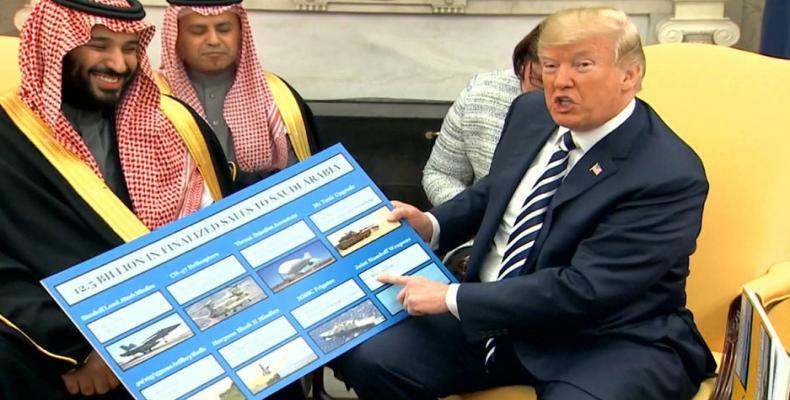Washington, May 23 (RHC)-- U.S. Secretary of State Mike Pompeo ordered officials at the State Department to find a way to justify the use of an emergency declaration meant to expedite the $8 billion weapons sale to Saudi Arabia, CNN reports.
Four sources in the U.S. State Department told the TV news network that they were stunned by the request to justify the emergency declared in May 2019 by Pompeo that enabled him to sidestep a congressional ban on arms export to the Riyadh regime amid the war on Yemen.
Under Pompeo's order, the sources said, State Department officials had to "reverse engineer the situation to provide the justification for a decision which was made in an aggressive and unconventional manner." One State Department official said: "They seemed to have a game plan and it had to be justified." Referring to Donald Trump, he added: "The attitude was very Trumpian."
Pompeo's demand sent offices at the U.S. State Department, with the regional office, the political military bureau and the legal office all set into motion to figure out how the emergency could be justified, according to the sources. The quick decision did not allow for a thorough discussion about the arms sale between the various government agencies involved.
"It seemed we [the Trump administration] were determined to turn a corner on [Jamal] Khashoggi (the Saudi dissident journalist murdered in Istanbul). The message was we need to move on, and provide the support," the official said. "It was an incredible display of audacity."
Last week, Trump fired State Department Inspector General Steve Linick, who was investigating his administration's use of emergency powers to sell arms to Saudi Arabia despite congressional opposition.
House of Representatives Foreign Affairs Committee Chairman Eliot Engel said he believes the probe into the $8 billion weapon sale could be one of the reasons for Linick's abrupt dismissal.
Pompeo denied any knowledge of the investigation, but The New York Times reported that the inspector general had sent the top US diplomat questions regarding the inquiry. Pompeo also claimed that the allegations that he retaliated against Linick were "patently false."
On Thursday, however, a group of House Democratic leaders sent a letter to Pompeo denouncing Linick's removal and demanding that he be reinstated.
"Based on longstanding concerns with your actions - and new reports this week about potential abuses - this assault on the integrity and independence of Inspectors General appears to be an intentional campaign to undermine their ability to expose corruption and protect taxpayer dollars from waste, fraud, and abuse," they wrote.
In a May 24, 2019 letter to US lawmakers, Pompeo said that he "determined that an emergency exists, which requires the immediate sale of the defense articles and defense services" to Saudi Arabia, the UAE and Jordan in a bid to deter what he called "the malign influence" of Iran throughout the Middle East.
"The law is written broadly, but an emergency still means something even in the broadest of context," said a US congressional aide. "It is outrageous to suggest that an emergency would require an $8 billion arms sale of this nature whereby much of the weaponry was not built, some licenses were even given to start building those weapons in Saudi Arabia, it is laughable."
Riyadh is the largest buyer of American-made weaponry. Trump signed an arms deal worth $110 billion with Saudi Arabia in May 2017 on his first foreign trip since becoming president. Before his presidency, he described the kingdom as "a milk cow" which would be slaughtered when its milk runs out.


